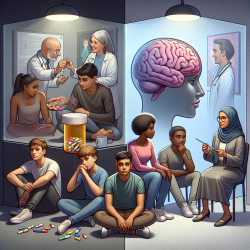Introduction
Attention-Deficit/Hyperactivity Disorder (ADHD) is a significant public health concern, affecting adolescents worldwide. The BEI-PSY Study, conducted in Beirut, provides critical insights into the prevalence and correlates of ADHD among adolescents in Lebanon. This blog post will explore the findings of this study and discuss how practitioners can leverage this information to improve therapeutic outcomes for children with ADHD.
Key Findings from the BEI-PSY Study
The BEI-PSY Study found that 10.2% of adolescents in Beirut were diagnosed with ADHD. This prevalence is notably higher than previous estimates in the region, which may be attributed to methodological differences, such as the use of structured diagnostic tools and interviews with both adolescents and their parents.
Significant associations were identified between ADHD and several factors:
- Academic difficulties, including a higher likelihood of repeating grades and requiring home tutoring.
- Involvement in bullying, both as perpetrators and victims.
- Higher rates of alcohol consumption and cigarette smoking.
- Comorbid emotional and conduct disorders.
Additionally, adolescents with ADHD and their parents reported a higher burden of illness and were more inclined to consider seeking mental health services compared to their healthy counterparts.
Implications for Practitioners
Practitioners can utilize these findings to enhance their approach to treating ADHD in adolescents. Here are some strategies:
- Comprehensive Assessment: Use structured diagnostic tools that involve both the adolescent and their guardians to ensure a holistic understanding of the child's condition.
- Address Comorbidities: Be vigilant about the presence of comorbid emotional and conduct disorders, as these can complicate treatment and require integrated therapeutic approaches.
- Educational Support: Collaborate with educators to provide tailored academic support, such as tutoring or special education services, to address learning challenges associated with ADHD.
- Family Involvement: Engage parents in the treatment process, emphasizing the importance of their role in managing ADHD and addressing any misconceptions or stigma associated with the disorder.
- Public Awareness: Advocate for increased public awareness about ADHD to reduce stigma and encourage early intervention and treatment seeking.
Encouraging Further Research
While the BEI-PSY Study offers valuable insights, further research is needed to explore ADHD's regional differences and treatment barriers. Practitioners are encouraged to contribute to this body of knowledge by conducting studies in diverse settings and populations.
Conclusion
The BEI-PSY Study underscores the need for increased awareness and resources for ADHD treatment in Lebanon. By implementing data-driven strategies and fostering collaboration among healthcare providers, educators, and families, we can improve outcomes for adolescents with ADHD.
To read the original research paper, please follow this link: Prevalence and correlates of ADHD among adolescents in a Beirut community sample: results from the BEI-PSY Study.










